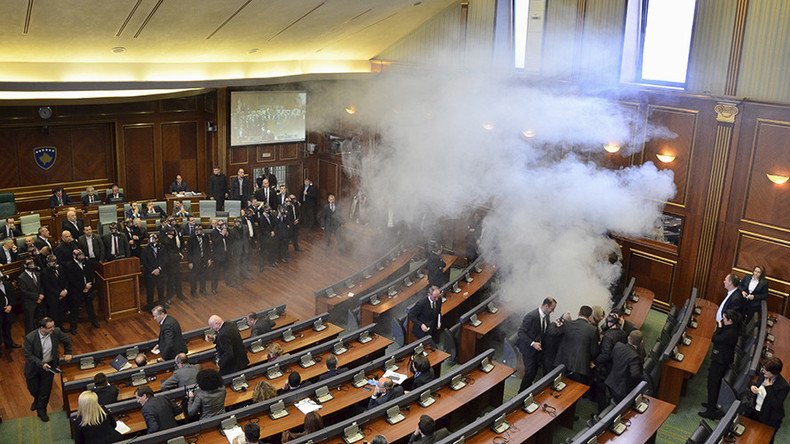Get the gas masks out: Opposition MPs disrupt Kosovo parliament with tear gas again

Opposition politicians in Kosovo have once again used tear gas to disrupt proceedings in parliament, in attempts to pressure the government into abandoning a deal signed in August which gives the Serb minority greater autonomy.
The session in parliament, which had been delayed for just under an hour, was suspended on Friday after a tear gas canister was released by an opposition politician. The device was smuggled into the building, despite security checks being carried out at the entrance.
Pristina Insight reported on its Twitter feed that one of the MPs who threw a tear gas canister was opposition politician Mytaher Haskuka. Another MP, Albulena Haxhiu, was pushed to the ground and had to be taken to hospital. Meanwhile, protesters gathered outside the parliament building.
(Gas)masked men + police come out of plenary room of #Kosovo Assembly after session interrupted by teargas 3rd time pic.twitter.com/hQLIxNEjfk
— Prishtina Insight (@PrishtInsight) February 19, 2016
The session eventually resumed in the afternoon, but no sooner had it started than it was again disrupted as a tear gas canister was released.
Friday’s disturbances followed protests carried out on Wednesday by members of the public in the capital Pristina, who were demanding that the government resign and elections be held. They too were protesting against the deal brokered by the European Union and signed by the government in August, which would give Kosovo's ethnic Serb minority greater local powers and the possibility of financing from Belgrade.
Carrying banners reading "We don't want Serbia in Kosovo" and "There is no state with thieves," protesters demanded the government resign within 10 days and call elections, Reuters reported. The next elections are not scheduled to take place until 2018.
"Kosovo is at a crossroads and we want to go down the right path, which is early elections," Fatmir Limaj, leader of the opposition party NISMA, told the crowd.
In January, protesters set Kosovo’s government headquarters on fire after throwing Molotov cocktails at the building. Firefighters rushed to the scene to extinguish the fire while police used tear gas and water cannon to disperse the crowds. Protesters, in turn, pelted stones and bottles at the security forces.
Friday’s incident at the Kosovo parliament is far from being a one-off. In December opposition lawmakers set off two tear gas canisters during a morning session, forcing other MPs to flee the hall as they put on gas masks and stood by demonstratively as the smoke filled the room. There was also a similar disturbance in October.
Over the past few months, the opposition has used various violent methods – including pepper spray, whistles, and water bottles – to force the government to tear up the agreements.
Aside from the issue of greater Serbian autonomy, opposition parties and their supporters also are against a deal signed with Montenegro to settle a border dispute between the two countries, as they believe it gives Kosovan territory to its neighbor.
A province of Serbia, Kosovo has been under effective NATO-led peacekeeping force control since 1999, after the alliance aided an ethnic Albanian rebellion against the Yugoslav federation that included Serbia and Montenegro. The province’s provisional government declared independence in 2008, which has since been recognized mostly by NATO countries and their allies. Russia does not recognize Kosovo as an independent state.
While the Serbian government has not officially recognized the renegade province, Belgrade has signed several “normalization” agreements with the Pristina authorities in recent years, under pressure from the EU and NATO.











